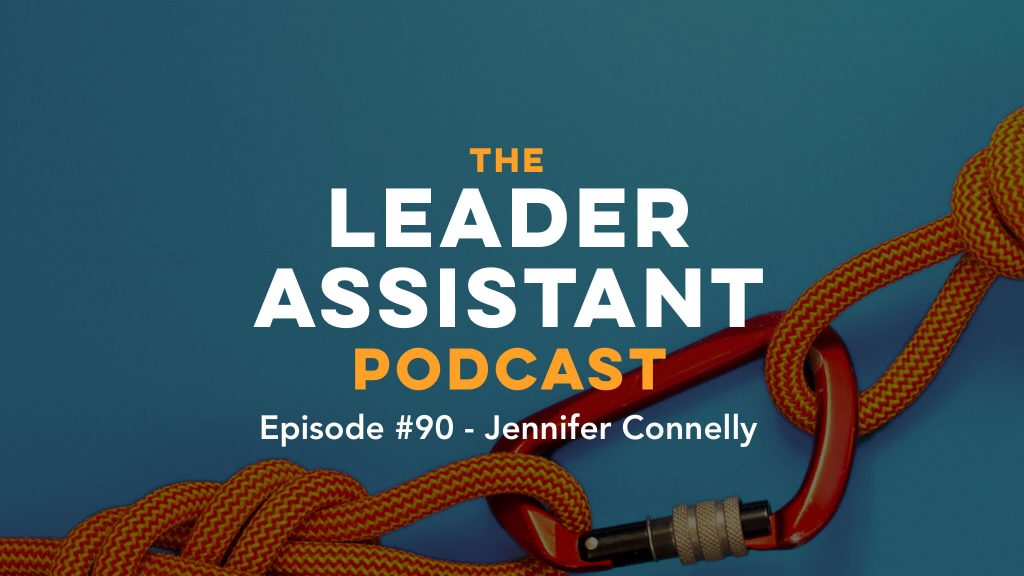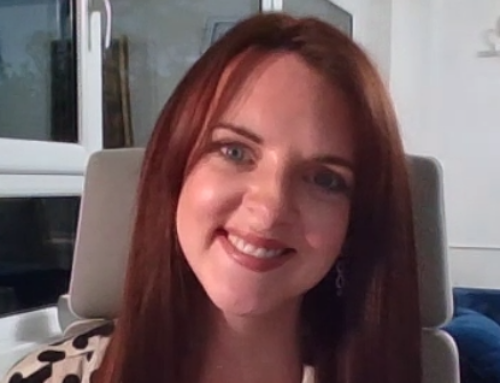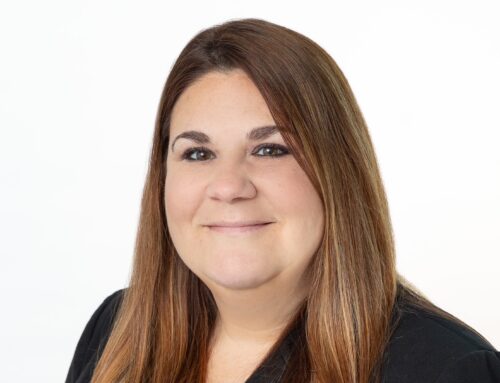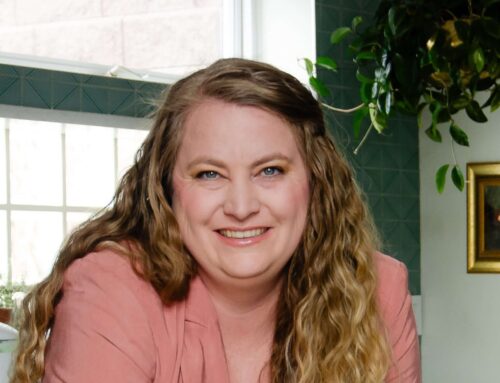Jennifer Connelly began her career in fashion working for designer Jeff Garner of Prophetik Clothing. After working her way up from intern to Brand Director, the 2008 downturn left her looking for the next chapter and she found her place working side by side with deeply talented visionaries in both the private and non-profit sectors.

Jennifer talks about her path from executive assistant to chief of staff to director of operations, how to go from being tactical to strategic, tips on helping your team raise capital, and more!
Whether you want to work your way “up” to being a Chief of Staff or not, I hope this interview encourages and challenges you!
Book recommendation: The Fifth Discipline (and the companion guide) by Peter Senge
LEADERSHIP QUOTE
The mind is everything. What you think, you become.
– Buddha
JOIN THE FREE COMMUNITY
Join the Leader Assistant Slack Community here, or the Facebook Group here for bonus content and to network with other assistants who are committed to becoming leaders!
CONNECT WITH JENNIFER
ABOUT JENNIFER
Jennifer Connelly began her career in fashion working for designer Jeff Garner of Prophetik Clothing. After working her way up from intern to Brand Director, the 2008 downturn left her looking for the next chapter and she found her place working side by side with deeply talented visionaries in both the private and non-profit sectors. Mrs. Connelly currently serves as the Director of Operations for Rallyday Partners in Denver, CO where she lives with her husband Dan and their Pomeranian.
THE LEADER ASSISTANT BOOK
Download the first 3 chapters of The Leader Assistant: Four Pillars of Game-Changing Assistant for FREE here or buy on Amazon here.
SUBSCRIBE
Subscribe to The Leader Assistant Podcast so you don’t miss new episodes!
You can find the show on Apple Podcasts, Spotify, Google Podcasts, Pandora, and Stitcher.
Join my email list here if you want to get an email when a new episode goes live.
LEAVE A REVIEW
If you’re enjoying the podcast, please take 2 minutes to rate and review the show on Apple Podcasts here. Each review helps me stay motivated to keep the show going!
—
EPISODE TRANSCRIPT
Jennifer Connelly 0:00
I’m Jennifer Connelly, today’s leadership quote is from the Buddha the mind is everything what you think you become. The Leader Assistant Podcast exists to encourage and challenge assistants to become confident game changing leader assistant
Unknown Speaker 0:20
in use your host my data.
Jeremy Burrows 0:24
Hey, everyone, thanks for tuning in to The Leader Assistant Podcast. Today I’m speaking with Jennifer Connelly. Jennifer is director of operations at Rally Day partners in Denver, Colorado. Jennifer, how’s it going?
Jennifer Connelly 0:37
Very good. Thanks for having me, Jeremy.
Jeremy Burrows 0:39
Yeah, so why don’t you tell us a little bit about where you’re from and how you ended up in the EAA profession earlier in your career.
Jennifer Connelly 0:48
Yeah, I grew up in Colorado Springs. And when I was in high school, I opted not to go to college. And instead of going to college, I sent letters all around the country, asking for an internship, I really, really thought that my life passion and dream was to be a fashion designer. And so I was asking for fashion design internships all over the country. And I ended up getting an internship in Nashville, Tennessee, that’s Nashville with an EN, with a designer named Jeff Garner, who at that time ran a company called prophetic, which was a streetwear design company, and I interned for a year before bringing being brought on as an executive assistant at that company.
Jeremy Burrows 1:34
Nice. So did you want to get into the EAA role? Did you kind of realize that, that was more aligned with what you wanted to do versus the fashion stuff? Or tell us about that? Because you said you wanted to get into fashion. And then next thing, you know, you’re an EA.
Jennifer Connelly 1:54
Yeah, so I worked for a gentleman, Jeff Gardner. And he is one of those visionary leaders who was a very talented designer. And I think that when you come across someone like that, you realize everyone has a complementary skill set. And for me, there was no room to be a designer, because there already was one. And I really got to learn all about the other side of the business world, whether that’s manufacturing process, accounting, cycles, sales, investor relations, all of the above. And that’s really where I excelled, and never really designed anything that sold. But I really got my feet wet as far as what it meant to be on the operation side of a company and learn that my true talent really was not in design, but really in business development, operations, and overall execution of strategy.
Jeremy Burrows 2:51
So that’s very similar to kind of how I shifted into the PA profession because I was a musician. And I realized, over time that there were other musicians, more talented than myself. And as I started doing the operations, and admin and details and project management and stuff, I realized that I was actually better than everybody else at this type of work. And that kind of shifted, but at first, it was like, a little sad, because I was like, I wanted to be this like, you know, famous musician that, you know, had a record that sold a lot of copies and whatever. So did you have any of that when you when you kind of realize that the design or the fashion stuff might not be your career?
Jennifer Connelly 3:42
Absolutely it is. It’s it’s a really strange realization and more of like an acceptance process that you get to with that. And for me, one of the outlets that I held on to for a really long time, probably 10 years is I did a lot of fashion styling, as my creative outlet. Because I think that, you know, we’re, we’re humans, and we’re very complex. And while we’re very good at business and operations, we’re still creative, and we have a creative need. And so, for me, I felt that I was styling music videos, which is mostly for Christian and country artist for a period of 10 years. But it was one of those double edged swords, where you, you really just get to learn what you’re good at. And it doesn’t mean that you’re not skilled at other things, but it’s more about understanding that you’re better at some things than others.
Jeremy Burrows 4:33
Yeah, definitely. What tell us about I’m just curious, tell us about the styling of the music videos like what does that entail?
Jennifer Connelly 4:42
Oh, it’s super fun. It is like any young girl or boy, whoever grew up dressing their Barbies, and like making them have little scenarios that they play out is just like that. And so you get to shop the most high end designer clothing collections before they’re even seen by anyone. And then you have these racks and racks of clothing that are just amazingly designed. And then usually, this is a very generalization. So I apologize if this offends anyone. But usually you get a set of musicians mostly for me, it was a lot of bands, a lot of male bands. And they come in usually wearing clothes that they’ve had on for two days, and they haven’t showered and they don’t really care what you put on them. And it’s this amazing blank canvas. And you get to put together this collection of clothing that is really ultimately a vibe that they want to put out a vibration, a style, a look and feel that that to them exemplifies their music and their style from a musician’s perspective. And, and really, what I learned from the experience is that that’s what fashion is, is that every day we all get to decide what to wear and what to put on. And we all decide what vibration do we put out? Are we powerful? Are we submissive? Are we bright and cheery? Are we dark? And stormy? Do we give a come here or stay away vibe, and that is something that was so powerful is learning to tell a story from clothing was such a good education for me from a business perspective? Because I think we all do that with our clothing. We do it with our communication. We do it with the way we interact with other people. Is that personal branding that you have.
Jeremy Burrows 6:27
So was there any funny, awkward embarrassing moments during that that time or do or even just is there a music video that maybe people that was more popular that you worked on that people might recognize the artist,
Jennifer Connelly 6:44
I have a really funny story, anyone who’s a fashion buff, I’ll drop a name. Cara del Levine, I was very lucky enough to style her very first runway show. And she wore this red dress as the grand finale in our show in. Gosh, I can’t even remember what year it was. But it was a eco show in London. And she had it been about 16 years old. And the funny part about it is that I dragged 150 pounds of equestrian boots from the United States to London. And there’s all these really tall models and none of them fit the boots that I brought. They’re all had much bigger feet. So I ended up going out in London and pulling all these old used horse riding boots from all these old vintage stores, big enough for the models to wear. And we get to show day. And this card Elving comes from a very famous family. Now this is her first show, but it was a big deal that she was in it. And so everything was high pressure. And she didn’t fit in any of the boots that we brought. And so backstage, we’re like doing the quick change and models running everywhere. And like the hardest part is getting the boots off that these girls are sweaty, they’re nervous, the boots are too tight, and we can barely pull them off. And at the end of the show is like car DelBene our superstar girl and and she just like doesn’t have time to put the right boots on. They’re all too small. So the designer Jeff Garner literally takes his own riding boots off of his feet, gives him the car DelBene walks down the runway with her wearing his boots. And it was one of those moments that like that is what an assistant is is that you run around making all this stuff happen. And at the end of the day, you get zero credit, but it’s all about making that moment happen for your boss, your brand, your company, whoever that is. And for me, like that was an experience in like, no credit, but all the pride in the world. You know, I just felt so, so proud of that moment. And, and as my career went on, and like I hadn’t had no idea who she was at the time, it’s a photo and a memory and a point of reference of time of, of the caliber of person I was working with and working for that. We all just did what we could to make it happen. And I think that happens a lot in assistants lifecycle is that you sacrifice everything to make that moment for other people happen.
Jeremy Burrows 9:06
Yes, well put. So okay, so let’s talk a bit about your EA career and then kind of the trajectory you’ve had where you went from EA to chief of staff. And then now you’re Director of Operations and I know a lot of so Well first let’s just tell us about your journey. And then we’ll get into you know, there’s I know there’s a lot of my listeners who aspire to kind of take on a chief of staff role, or maybe they they do have aspirations of being a director of operations. So we can get into what you would encourage them with but let’s just tell us about your your role shifting throughout your career and how that all worked and the pros and cons and all that fun stuff.
Jennifer Connelly 9:58
Great question. Yeah, so I, like I said, I graduate high school, sent out letters, I worked for a designer Jeff Garner in Nashville. And I had this crazy wild ride of about four and a half years where I was traveling the world and learning all these things about the fashion industry. And then 2008 happened, and no one was buying $50 T shirts anymore. And my whole world changed really quickly because my position was no longer needed or necessary or even affordable. And so I had to really swallow my pride and my dreams and and take stock first of all about what I’m good at and what I want. And that’s where I started. And what I’m really good at was operations. And what I really wanted in life is to not feel the way I felt when my job ended ever again. And, you know, like that’s, you know, I think unattainable because you don’t have control of things. But it was a trajectory for me. And so I found myself very, very, very open to finding a job that paid my bills and also served my skill set. And I went to Florida and I worked for a woman that had apothecaries, at that time, in several places around Florida. And I loved my interview. And I hope someone else relates to this, as I showed up to the interview, this woman had paper files, she had a paper inventory system, she had no social media. It was such an easy when I went in there, I worked for her for a few years and changed your whole life from analog to digital. And for me, it was like very easy and simple. And like, you know, seems like common sense. But for somebody who’s never used email, it was terrifying. So it’s a really good kind of midpoint for my career. And, and I love the south. But I grew up in Colorado. And I know Jeremy, you’ve been here before your brother’s here in Denver. And it’s just a different lifestyle here. And I really wanted to come back home. And so I, I did everything I could I applied everywhere I interviewed I interviewed I interviewed, and I ended up getting hired at an investment group. And I knew I knew nothing about financial services, or investments or private equity or anything like that. And, and really, I think it’s life is a bit of, you know, opportunity meets luck, first preparation. And this is a very young investment group, and they didn’t have much systems or processes. And they were digital, not analog. But it was a good opportunity for me to really highlight what I could bring to the table, my value proposition, how can I make your company better by hiring me. And they did, they hired me, I moved back to Denver. I actually On a sidenote, personally, I moved next door to what is now my husband, we happen to be next door neighbors on the same street. And it was all because of this decision to take a chance to make a move and do what I felt was best for me. I worked for that company. And until they they actually decided to close their operations. And I was hired on at a very prestigious real estate development firm in Denver called continuum partners. And that really was how I went from fashion into kind of more financial services investments. And it changed my life, it it was really a an opportunity to hone what I’m good at to create some competence in my skill set, but also enough for me to know that I would want more for my life than just that role. So it was a really good training ground for me. And once I got to continue on partners, I my title, it’s funny, because titles are so arbitrary. And I’ll speak to that a little bit later. But my title was private wealth manager, meaning that I managed the wealth of the partners, I handle their family office, pay their bills, sent their kids allowance, cash management, and I had a slash what I think I think a lot of people in this world have you have a slash title. So you’re this and you’re that so I was a private wealth manager and an executive assistants. And so I got to, to really dive deep into these partners financials, but also I supported them on a business level. So I manage their calendars and their travel, and who spoke to them and what deliverables they had. And I told them what was important. And, and for me, and how I operate that slash and my title was like disconcerning and it was uncomfortable and I didn’t like having a slash I didn’t like the split in that I wanted to be more focused and and have more of a clear vision of what my role was. And so I had this crazy experience and I hope that everyone that’s listening has this in their life is I had a I had a recruiter come and knock on my door and poach me away and And then never have ever had happened to me before. I was always one on the hunt. I was always interviewing, always sending resumes, always looking looking looking looking for the next opportunity. And then at this point I wasn’t I was very contented and happy at continuing partners. It was a great job, a great learning experience. Maybe that slash bothered me a little bit in the back of my mind, but not enough to go looking. I wasn’t looking, I wasn’t interviewing, I wasn’t sending my resume. And this woman, her name is Leilani Ellis, and she runs executive admin. So if you’re looking for a job, I highly recommend looking her up. She found me she poached me. And she was she was so clever that she thought she was so clever. I love a lot of you. But she said she had a confidential client who was looking for someone. And she was so crafty about it, that it got my interest. And I went to lunch with her. And I spent an hour with her. And I guess who it was, by the end of lunch. I knew who it was, just because I know, Denver, folks and their elite, and I guess who it was. And after that, I said, Yeah, I’ll have 30 minutes of coffee with this person. And I did. And I had this coffee. And I went in there. And I remember having this conversation with my husband and saying like, you know, I’m really, really hot, like, we’re good. Everything’s fine. Like everything is comfortable at this moment. I’m gonna just go out of curiosity, right? Like, what would this super elite person want with me and I went to this coffee. And it was such a life changer. And I ended up taking a job. And I took a job as a chief of staff to a CEO, who had never, ever, ever had an assistant. And when I got there, Jeremy, day one, I opened the calendar, cracked that baby open, it is blank. There is nothing on that calendar. So I said to him, I was like, Hey, I’m like, How do you know where to be like, you are really important and in demand and like, you have 13 direct reports like how do you know where to be at? And when, and I was so sad at his response. And he said, very shy and cheapest lady, he says, well, people will just text me and and they’ll say like, where are you? And and I was like, Okay, well, this is never ever going to happen to you again, ever, like you’ll never have that response. And that was really the transition for me from going into that executive assistant role to a chief of staff role. And really, that that was a difference in my career. But it really was taking stock of what I want going after it, having someone identify me as a talent, and being willing to risk the meeting and take the meeting. And then I decided if I wanted it or not, and I did.
Jeremy Burrows 17:50
So what would you say? Maybe? What’s your like, two sentence explanation of the difference between an EA and a chief of staff roll
Jennifer Connelly 18:02
a want to be one? I think that to back that a little bit up is that I think titles are so arbitrary. There. There are just as many EAS that are a chief of staff, that their company doesn’t have a title that fits that.
Jeremy Burrows 18:21
Yeah, I agree. Yeah, it’s like, it’s it really, there’s so many different variables. So you know, it’s like, are you in a fortune 100 company with 1000s of employees and a very clear title, salary band structure? Or are you in a startup that everybody’s just kind of making it up as they go? Like, are you in financial tech? Are you in construction? Are you in? You know, retail, it just really depends on where you’re at. So I agree. It’s like, it’s about what you what you make of the role and the title really doesn’t matter. So
Jennifer Connelly 19:05
I would agree, I would also add that, you know, if if we want to get real nitty gritty, because I know that a lot of people have this question. So it’d be more nitty gritty about it is, for me is the definition between being tactical task oriented, or strategic, meaning you understand the strategy, and you are taking all the efforts to execute on that strategy, which could be task based, but it’s really, really difference between Do you understand the overarching executive strategy? Are you executing that? Or are you just checking boxes on a task list? And I think that’s a really good way for individuals to decide what side of the fence they lie.
Jeremy Burrows 19:50
Yeah, that’s great. So now though, you went from chief of staff now you’re actually a different title, Director of Operations, which is is pretty. I don’t think that’s, you know, shocking that EA, slash chief of staff would eventually turn into a director of operations. But what was that shift? Like?
Jennifer Connelly 20:15
Yeah, that’s a valid point, I think, you know, it’s all it’s all incremental. So for me, I spent a few years working for a CEO as his chief of staff. And lucky for me, or unlucky, as it was, he was transitioning out of the role, we actually replaced himself with another CEO. So I went through a CEO transition, which is, is very uncomfortable, if anyone has been through that, it’s really tough. So if you’ve done that, props to you, it’s really hard. But it really creates a lot of emotional distress for somebody leaving a company that they’ve been a CEO. It’s a lot of a lot and you know, Chris, a lot of questions of like, what’s next, what’s next. And I was really fortunate that I was a chief of staff to somebody who was a CEO. And, and, and, and he had a private equity fund, and he was a philanthropist and India and so he had all these other needs for me outside of that CEO role, and very graciously allowed me to tag along and, and be a part of that journey. And so, in part of that soul searching exercise, he really found it desired himself to go back into private equity, which is where he came from. And to do that in a very different way. And we joke a lot about calling it private equity 3.0. First, it started out as 2.0 When our 3.01 year in and, and my boss Ryan Heckman founded Rally Day partners with Nancy Phillips, Mark Hopkins and Travis Conway. And, and they were super gracious and allowed me to be part of their journey as a founder. And and I think that it’s it really is one of those situations that people talk a lot about having a mentor and a mentor is really great and very necessary. And there’s somebody who is advising you, and helping you to navigate the unseen on your path. But I think a lot of what isn’t spoken about is the role of a sponsor. And what I mean by that is somebody who puts their money where their mouth is, and not only do they advise you, but they help you in any way they can. Whether that’s putting you up for a position or helping you pay for training or a degree or whatever it could possibly be is somebody who believes in you so much. Not only are they willing to give you their recommendation, but also to help you get to that next step. And for me, this is one of those folks, Brian Hackman is a sponsor of my life. And he, he really backed me in any way that he could, but also, he expected me to deliver and so what’s that 5050 Someone sets you up and you got to spike the ball down. And for me, that was also a pivotal point that we spent those years together, he knew I had the operational diligence to run a private equity firm, but no one else on the team did. And so it was a lot about giving me the opportunity, the opportunity to prove myself and he really did that for me. And so in my career, I I always look for those I can sponsor and those I can really volley so they can set and spike it themselves. But that’s it. I think that’s what life is is the opportunity to prove yourself and and it’s rare to get that and when you do you have to deliver.
Jeremy Burrows 23:45
Yeah, so did you play volleyball in high school?
Jennifer Connelly 23:47
God I’m only five two so no, I was I was more of a gymnast. But if I could have played volleyball, I would have killed it. I just was not tell it.
Jeremy Burrows 23:57
Before we get to next question, so you’re in private private equity. A lot of EAs myself included do a lot of work with helping their executives raise money. Yes. Any any tips on how to raise money?
Jennifer Connelly 24:17
I would say raising money tip is this. Get a placement agent. If you don’t have one call pace, no capital, they’ll help you. Raising money is a very specialized skill. And for an EA it is a nightmare. I’ll be really honest, it’s really a nightmare. Because there’s so much travel so much logistics and and honestly you’re looking for like a 5% success in every meeting. So you spend six months traveling back I mean, I think you do like 100 meanings in a few months. And and you’re just looking for five that are good and so no one comes home happy Everyone’s upset. It’s a really terrible All experience. So if you’re in it, get some help getting an expert to help you and, and really just give yourself some praise. You’re doing a good job. Yeah, we
Jeremy Burrows 25:09
did 400 400 or so meetings in three months during our series B rounds, so it’s fun time.
Jennifer Connelly 25:18
Good Lord, props to you. That is tough. It is hard. And that’s just from a scheduling standpoint, imagine going to those meetings.
Jeremy Burrows 25:27
Well, that sounds good to say it’s my CEO, like, literally like give the same pitch, same 25 minute pitch. Over and over, I think there was a couple of days in the middle of that, that he did, like 20 of them in one day. So
Jennifer Connelly 25:43
my god bless you. Both sides, so hard.
Jeremy Burrows 25:48
So okay, so then if an EA is listening, and they want to do what you said, when you talked about the difference between being tactical and strategic, maybe they want to be a director of operations. Someday, maybe they want to be a chief of staff. Or they just, you know, again, the title doesn’t really matter. They just want to be more strategic. What, what’s maybe one or two tips that you would give to someone who’s trying to transition from tactical to strategic?
Jennifer Connelly 26:25
Really good question. It’s hard, I’m going to just start there and give you props for wanting that because it’s really difficult being an executive assistant, that assistant part of the title is such a mountain to climb. And it’s all about positioning yourself. And I’ll say, firstly, that starts with you. So getting your own mind, right, that you are capable and competent, and just as valuable as any other person on your team that starts with your own thoughts. And then, if you have doubts, as I did, you know, I always, always look for opportunities to level up, and I’ll give some specific examples is I learned Adobe, I got Adobe Certified, I’m not great, but I learned to edit other people’s work, I’m not creating things, I can edit other people’s things. You know, project management certification is really some steps you can take, you can take it all the way as far as getting a degree, but for me is like, have those small steps, have somebody that you can talk to about that and have encouragement. But any small step you can make is an improvement on your resume. And it is all building blocks. And so however, you may feel that your team precedes you. That’s not your job, your job is to get better. And it doesn’t matter if your team accepts that the next team will. And you just have to be confident in your ability. And a lot of that comes with education. So it start first with small steps. Secondly, is take an inventory of the assets you already have. Every one of us here has somebody who believes in us. And that is a great place to start, you need to start with a sponsor, start with somebody who believes in you. And really, really hone in on what it is that you want and the tiny steps every day that you can get there.
Jeremy Burrows 28:31
That’s great, great advice. I like your point. Not worrying about other people’s perception of you, because you can’t really control that you just do you and you’re so
Jennifer Connelly 28:47
right, Jeremy. I mean, if you if you don’t have haters, you’re not doing something right. So if you got one hater, congratulations.
Jeremy Burrows 28:57
What if you have a few because even better,
Jennifer Connelly 28:59
even better, Jeremy, come on. That means that you’re doing really good because people don’t hate on other people that are not doing well. If you’re mediocre, you’re ignored. If you’re doing good, you have a hater. So appreciate that. And give them some love there. They’re also serving a purpose for you.
Jeremy Burrows 29:17
Yeah. Yeah, kill them with kindness. That’s how I tried to do it. That’s good advice. All right. So what if you’re listening and someone’s listening and they are perfectly content with being an EA, they don’t want to be a chief of staff. They don’t want to be a director of operations. They just really enjoy the role as it is. Is that Is that okay? Is that something that you know, like, because, you know, I was in my last role it was that was me. I was I kept getting asked, Hey, you know, do you what do you what do you see your career progression looking like, do you see you know, you could be a director of operations someday. I don’t know, it’s like, I don’t really want that stress. I don’t want that pressure. Like I like my role. But I think there are I think some people feel maybe ashamed or guilty, or, like they’re not a good EA, if they don’t strive for more than the tattoo tactical EA roll, does that make sense?
Jennifer Connelly 30:21
Totally. And I would just highly disagree with that. And if your thoughts are telling you that the EA is just an EA, then that’s not the responses, this is not true. Because EA is are the most powerful people in this world. And if you are happy being an EA, that means you’re happy with yourself, and you have more contentment than most people on this earth. So I think it’s all arbitrary. There, the titles are, are just so loose, and, and from me, it’s like, if you’re happy where you are, then you’ve made it, congratulations, you know, like, that is something to celebrate. And the only the only thing left for you is to give back. Give your wisdom to somebody else. Give your wisdom and encouragement sponsor, somebody else sponsor, that executive assistant, or administrative assistant, or someone you see along the way that could really use a few words of encouragement each month, and help them give them tips on how to book appointments more successfully, or use excel more successfully, and really share your knowledge. Because if you’re happy doing what you’re doing, you are the top 99% of this world, and I applaud you.
Jeremy Burrows 31:44
Yeah, that’s great. I think that there’s nothing wrong with being content where you are and not wanting to push yourself or try something just because other people think that you should or just because that’s kind of, well, that’s the career progression. And that’s, that’s what’s next. So totally agree. What, what is a resource, though, if you are like, You know what, I want to be a CEO or CEO someday, what’s a book or a resource that you recommend to assistants who you kind of do want to shift into that type of a C suite role?
Jennifer Connelly 32:23
I have two recommendations. My first is the leader assistant. Not sure who wrote that one. But
Jeremy Burrows 32:31
there, I did not tell you to say that
Jennifer Connelly 32:33
you did not. I’ve read it though, I will say if you haven’t read Jeremy’s book, please do. There are four pillars in there that are so easy to relate to, and also to create an action plan around and you should know where you’ve come from before you go somewhere. So leader assistant is my number one. The second one that I like to plug is an oldie but a goodie, if you really want to be on the C suite, you need to understand what that means. And you need to understand an organization as a whole, how it operates. what the purpose is it a learning organization, a stagnant organization, there is to two resources by Peter Cengage. The first is called the fifth, The Fifth Discipline, that’s five, zero, but Fifth Discipline. And the second part of that is The Fifth Discipline guidebook. So it’s kind of like a how to and then how you’re doing it. It’s all about creating a learning learning organization, which I think is the success of any living, breathing organization that successful today. But also, as you know, the first the very first thing, and I know that this is true with all my heart is how do you create a successful organization? The very first thing that you do is you create a shared vision of the organization. What is the purpose of this organization? Why do we exist, and it mostly starts with the founder or CEO. But ultimately, the CEO is responsible for executing the vision as every other person at the organization. So it’s important to know how to create a shared vision before executing upon that. So first of all, start with leader assistant, get to know yourself. Second of all, go to the Fifth Discipline by Peter Cengage and really understand what it means to run a company. And it’s really hard. It’s really difficult.
Jeremy Burrows 34:35
Yeah, that’s great advice. I’ll, I’ll put a link to Peter’s book in the in guidebook in the show notes so people can find that easily. And thanks for the shout out on my book. Appreciate it.
Jennifer Connelly 34:48
Such a good book, Jeremy, congrats to you just to pause here and be like, damn, damn, good job.
Jeremy Burrows 34:53
Thank you. Thank you. All right. Well, let’s wrap it up with one of my favorite questions to ask what makes us Is that a leader?
Jennifer Connelly 35:03
Oh, God, you open the floodgates here. So I’ve been very lucky. And one of the people that I truly admire and follow explicitly daily is, his name is Brian Chi Chi GHG, he has a daily email called the daily discipline, in one of his pit, like pillars of his thesis is this is that there are leaders in all of us. And we all lead what’s called our 20 square feet. And that is a very arbitrary number 20 square feet. So if you think about it like this, I’m an Assistant, I’m at my desk, I only have my own space to take care of, but at the end of the day, I’m a leader of my own square feet. All of us are leaders, whether we are an executive assistant and chief of staff as CEO, maybe we are we run the front desk, or maybe we’re out on the field, we all lead. And the truth is, what is being a leader, it is the experience of us, we lead that. So how do you interpret me? How clear Am I communicating? What is the culture of being around me, all those things fall into my 20 square feet. And for me, every single day, I own that 20 square feet, whether it’s been as an assistant as a director, hopefully one day as the C suite executive. I own that, so do you, you get to decide how people feel when they interact with you. It’s what you say it’s what you don’t say, and it’s how you say it. And that’s how you’re a leader every single day of your own 20 square feet.
Jeremy Burrows 36:43
Mic drop. Thanks, Brian chi. Awesome. Well, really appreciate you, Jennifer, sharing your story and being on the show. And is there somewhere online that people can find your connect with you reach out and say, Hi,
Jennifer Connelly 37:01
Guys, I’m on LinkedIn, Jennifer Connelly, Rally Day partners. Feel free to reach out to me I’m happy to respond. Otherwise, keep doing you lead your 20 square feet. And I hope that at the end of the day, you’re content and happy with whatever title that you get.
Jeremy Burrows 37:18
Perfect. Well, thanks again. And we’ll talk soon and we’ll put the link to your LinkedIn in the show notes. So thanks so much, Jennifer.
Jennifer Connelly 37:26
Thanks, Jeremy. Appreciate it. Anything I do to support you just let me know.
Speaker 3 37:39
Please review on Apple podcasts. Goburrows.com






